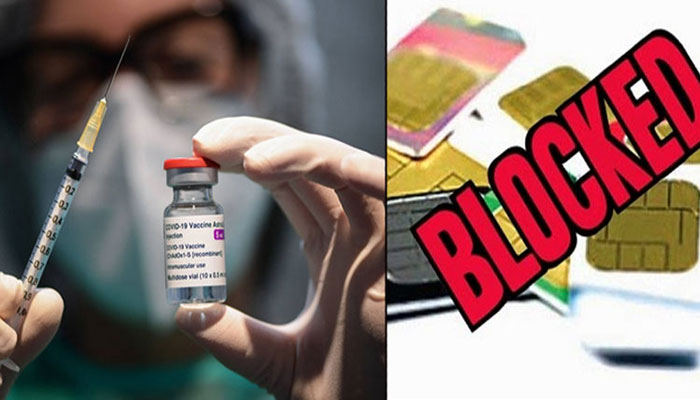Blocking SIMs of unvaccinated only option?
ISLAMABAD: The government has again warned the unvaccinated of blocking mobile SIMs.
If the government seems serious about penalising individuals for their negligence, it should not cause a harm to any major sector contributing a lot to the economy rather it should take measures disincentivise specific individuals.
The best option could be suspension of Computerized National Identity Cards (CNICs) at first stage for two weeks and if the person does not come forward then the blocking of CNICs could be considered.
However, the telecom players are quite perturbed with this latest warning. They cite the Universal Declaration of Human Rights which states that “Everyone has the right to freedom of opinion and expression; this right includes freedom to hold opinions without interference and to seek, receive and impart information and ideas through any media and regardless of frontiers.”
Keeping that in mind, it comes as an unpleasant surprise to hear Information and Broadcasting Minister Fawad Chaudhry announcing that if voluntary Covid-19 vaccinations do not increase, the government will consider blocking mobile phone SIMs around the country.
Cell phone service and internet suspension has become a common tactic for governments to control potential unrest in developing countries.
Such suspensions are more harmful than beneficial to the democratic process.
People around the developed world view technology as a great tool for democracy. However, in the other parts of the world, people have realised to a great extent that technology also holds the power to be used against the people that it is meant to connect with. Of course, such controls are explained as useful in stopping the spread of misinformation or hate speech, but such explanations can also mask ulterior motivation in many cases.
SIM blocking can even hinder the supply of critical medicines and deployment of medical services. The National Command Operation Centre has declared communication an essential service, especially in emergencies and must not be taken away.
In Pakistan’s case, where communication service penetration is already inadequate, the government should do more to connect people.
Many small-scale merchants and organisations in Pakistan derive most of their revenue by advertising their products and services in public WhatsApp groups, allowing hundreds of buyers to see advertisements at a time. By blocking vital communication channels, the government would be putting pressure not only on such businesses, but also on network operators and immense stress on the public. Entire families around the country rely on a single CNIC for everyone’s mobile phone SIMs. If that one person volunteering his or her CNIC for everyone’s connectivity has his or her SIM blocked, everyone in the household pays the price.
This communication blocking is among the primary reasons why Foreign Direct Investors have reason to show reluctance to do business in Pakistan. There are some other solutions that the government can consider, for the purpose of encouraging vaccination, such as taxation, blocking of CNICs/driver’s licence, domestic travel restrictions etc.
This approach would allow the government to responsibly tackle the challenge of vaccination, instead of allowing the private sector to bear the losses.
Blocking communication services also hinders freedom of speech —- a basic, fundamental right to express opinion without censorship, pressure, or fear of punishment or worse. This freedom has to be respected by the government and must not be threatened.
-
 King Charles Takes A Major Step To Keep Horrified Prince William Out Of The Loop On Andrew: Insider
King Charles Takes A Major Step To Keep Horrified Prince William Out Of The Loop On Andrew: Insider -
 Taylor Swift Set To Make Biggest Cut From Her Wedding Guest: Blake Lively Or Ryan Reynolds
Taylor Swift Set To Make Biggest Cut From Her Wedding Guest: Blake Lively Or Ryan Reynolds -
 Prince William Meets Saudi Crown Prince Mohammed Bin Salman
Prince William Meets Saudi Crown Prince Mohammed Bin Salman -
 Brooklyn Beckham Brutally Cuts Off Inner Circle Amid Feud With David, Victoria
Brooklyn Beckham Brutally Cuts Off Inner Circle Amid Feud With David, Victoria -
 Kaley Cuoco Reveals Why Fiance Tom Pelphrey Sleeps In Seperate Room
Kaley Cuoco Reveals Why Fiance Tom Pelphrey Sleeps In Seperate Room -
 Ghislaine Maxwell Will Not Answer Congress Questions On Epstein
Ghislaine Maxwell Will Not Answer Congress Questions On Epstein -
 Kensington Palace Announces Prince William's Arrival In Saudi Arabia
Kensington Palace Announces Prince William's Arrival In Saudi Arabia -
 ‘Andrew Crisis Follows King Charles Everywhere Now’
‘Andrew Crisis Follows King Charles Everywhere Now’ -
 Jennifer Aniston Already Decided Her Wedding Dress?
Jennifer Aniston Already Decided Her Wedding Dress? -
 Prince Harry, Meghan’s Hollywood Party Drama Exposes Chaotic PR Strategy
Prince Harry, Meghan’s Hollywood Party Drama Exposes Chaotic PR Strategy -
 Jennifer Garner Reacts To Savannah Guthrie's Video As Search For Nancy Guthrie Continues
Jennifer Garner Reacts To Savannah Guthrie's Video As Search For Nancy Guthrie Continues -
 Bad Bunny Leaves Fans Worried With Major Move After Super Bowl Halftime Show
Bad Bunny Leaves Fans Worried With Major Move After Super Bowl Halftime Show -
 Captain Jason Talks Personal Hardships He Faced Ahead Of 'Below Deck' Season 4
Captain Jason Talks Personal Hardships He Faced Ahead Of 'Below Deck' Season 4 -
 Anti-monarchy Group Reacts To Prince William, Kate Middleton Statement On Epstein Scandal
Anti-monarchy Group Reacts To Prince William, Kate Middleton Statement On Epstein Scandal -
 Andrew 'must' Apologize Not Wider Royal Family For Jeffrey Epstein Links
Andrew 'must' Apologize Not Wider Royal Family For Jeffrey Epstein Links -
 Super Bowl 2026: Why Didn't Epstein Survivors Ad Air On TV?
Super Bowl 2026: Why Didn't Epstein Survivors Ad Air On TV?




